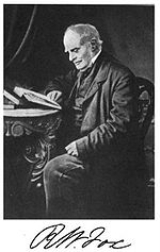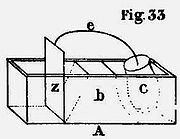
Robert Were Fox the Younger
Encyclopedia
Robert Were Fox FRS (26 April 1789 – 25 July 1877) was a British geologist
, natural philosopher and inventor. He is known mainly for his work on the temperature of the earth and his construction of a compass to measure magnetic dip at sea.
, United Kingdom
, the eldest son of Robert Were Fox
(1754 – 1818) and his wife, Elizabeth Tregelles. He had nine siblings. The Fox family
were members of the Religious Society of Friends
(Quakers), and were descended from members who had long settled in Cornwall
, although they were not related to George Fox
who had introduced the community into the county.
In 1814, Fox the Younger married Maria Barclay (1785 – 1858), daughter of Robert and Rachel Barclay of Bury Hill, near Dorking, Surrey. Maria's sister, Lucy, married Fox's cousin, George Croker Fox (1784–1850).
Robert Were Fox the Younger and his wife had three children, Anna Maria
(1816 – 1897), Barclay
(1817 – 1855) and Caroline
(1819 – 1871). Both Caroline and Barclay Fox's journals have been published.
Robert Were Fox the Younger died on 25 July 1877 and was buried at the Quaker Burial Ground at Budock.
of the U.S.A in Falmouth from 1819 to 1854.
Fox and Joel Lean were granted a patent in 1812 for their modifications of steam engines.
, near Falmouth, became noted for the number of exotic plants which he and his son, Barclay, had naturalized.
 Fox's work was in what today would be referred to as geophysics
Fox's work was in what today would be referred to as geophysics
. He was distinguished for his researches on the internal temperature of the earth, contributing papers to the Royal Geological Society of Cornwall
, and being the first to prove that temperature definitely increases with depth (the geothermal gradient
), his observations being conducted in Cornish mines from 1815 for a period of forty years. In 1829 he began a set of experiments on the artificial production of miniature metalliferous veins by means of the long-continued influence of electric currents, and his main results were published in 1836.
In 1834 Fox constructed an improved form of deflector dipping needle compass, or dip circle
, for polar navigation. One was used by Sir James Clark Ross
on his Antarctic expedition and used to discover the position of the South magnetic pole
.
He was a key person in the development of the Royal Cornwall Polytechnic Society
and its promotion of scientific research and training. He was an active member of the British Association for the Advancement of Science
.
Robert Were Fox, his cousin, George Croker Fox (1784–1850) and brother, Alfred Fox, assembled excellent collections of minerals, which are now in the British Museum (Natural History), given by Arthur Russell.
(1889), Fox authored 52 scientific papers.
----
Geologist
A geologist is a scientist who studies the solid and liquid matter that constitutes the Earth as well as the processes and history that has shaped it. Geologists usually engage in studying geology. Geologists, studying more of an applied science than a theoretical one, must approach Geology using...
, natural philosopher and inventor. He is known mainly for his work on the temperature of the earth and his construction of a compass to measure magnetic dip at sea.
Life and family
Robert Were Fox the Younger was born on 26 April 1789 at FalmouthFalmouth, Cornwall
Falmouth is a town, civil parish and port on the River Fal on the south coast of Cornwall, England, United Kingdom. It has a total resident population of 21,635.Falmouth is the terminus of the A39, which begins some 200 miles away in Bath, Somerset....
, United Kingdom
United Kingdom
The United Kingdom of Great Britain and Northern IrelandIn the United Kingdom and Dependencies, other languages have been officially recognised as legitimate autochthonous languages under the European Charter for Regional or Minority Languages...
, the eldest son of Robert Were Fox
Robert Were Fox the Elder
Robert Were Fox was a Quaker businessman who lived in Falmouth.- Life and work :Fox was born in Fowey, Cornwall, in the United Kingdom, and married Elizabeth Tregelles in 1788. The couple had six sons, including Charles Fox of Trebah, Robert Were Fox FRS of Penjerrick Garden and Alfred Fox of...
(1754 – 1818) and his wife, Elizabeth Tregelles. He had nine siblings. The Fox family
Fox family of Falmouth
The Fox family of Falmouth, Cornwall, UK were very influential in the development of the town of Falmouth in the 19th century and of the Cornish Industrial Revolution...
were members of the Religious Society of Friends
Religious Society of Friends
The Religious Society of Friends, or Friends Church, is a Christian movement which stresses the doctrine of the priesthood of all believers. Members are known as Friends, or popularly as Quakers. It is made of independent organisations, which have split from one another due to doctrinal differences...
(Quakers), and were descended from members who had long settled in Cornwall
Cornwall
Cornwall is a unitary authority and ceremonial county of England, within the United Kingdom. It is bordered to the north and west by the Celtic Sea, to the south by the English Channel, and to the east by the county of Devon, over the River Tamar. Cornwall has a population of , and covers an area of...
, although they were not related to George Fox
George Fox
George Fox was an English Dissenter and a founder of the Religious Society of Friends, commonly known as the Quakers or Friends.The son of a Leicestershire weaver, Fox lived in a time of great social upheaval and war...
who had introduced the community into the county.
In 1814, Fox the Younger married Maria Barclay (1785 – 1858), daughter of Robert and Rachel Barclay of Bury Hill, near Dorking, Surrey. Maria's sister, Lucy, married Fox's cousin, George Croker Fox (1784–1850).
Robert Were Fox the Younger and his wife had three children, Anna Maria
Anna Maria Fox
Anna Maria Fox was a promoter of the Royal Cornwall Polytechnic Society and the artistic and cultural development of Falmouth in Cornwall, UK.-Family links:...
(1816 – 1897), Barclay
Barclay Fox
Robert Barclay Fox was a businessman, gardener and diarist, a member of the influential Quaker Fox family of Falmouth.-Family relationships:...
(1817 – 1855) and Caroline
Caroline Fox
Caroline Fox was an English diarist. She was the daughter of Robert Were Fox FRS of the influential Fox family of Falmouth, and was the younger sister of both Barclay Fox, also a diarist, and Anna Maria Fox....
(1819 – 1871). Both Caroline and Barclay Fox's journals have been published.
Robert Were Fox the Younger died on 25 July 1877 and was buried at the Quaker Burial Ground at Budock.
Business interests
Fox was involved in many aspects of his family's businesses, along with several of his brothers. He also served as Honorary ConsulConsul (representative)
The political title Consul is used for the official representatives of the government of one state in the territory of another, normally acting to assist and protect the citizens of the consul's own country, and to facilitate trade and friendship between the peoples of the two countries...
of the U.S.A in Falmouth from 1819 to 1854.
Fox and Joel Lean were granted a patent in 1812 for their modifications of steam engines.
Horticultural interests
Fox's gardens at Rosehill and PenjerrickPenjerrick Garden
Penjerrick Garden, often referred to as "Cornwall's true jungle garden", lies between Budock Water and Mawnan Smith, near Falmouth, United Kingdom....
, near Falmouth, became noted for the number of exotic plants which he and his son, Barclay, had naturalized.
Scientific work

Geophysics
Geophysics is the physics of the Earth and its environment in space; also the study of the Earth using quantitative physical methods. The term geophysics sometimes refers only to the geological applications: Earth's shape; its gravitational and magnetic fields; its internal structure and...
. He was distinguished for his researches on the internal temperature of the earth, contributing papers to the Royal Geological Society of Cornwall
Royal Geological Society of Cornwall
The Royal Geological Society of Cornwall is a geological society based in Cornwall in the United Kingdom. It was founded in 1814 to promote the study of the geology of Cornwall, and is the second oldest geological society in the world....
, and being the first to prove that temperature definitely increases with depth (the geothermal gradient
Geothermal gradient
Geothermal gradient is the rate of increasing temperature with respect to increasing depth in the Earth's interior. Away from tectonic plate boundaries, it is 25–30°C per km of depth in most of the world. Strictly speaking, geo-thermal necessarily refers to the Earth but the concept may be applied...
), his observations being conducted in Cornish mines from 1815 for a period of forty years. In 1829 he began a set of experiments on the artificial production of miniature metalliferous veins by means of the long-continued influence of electric currents, and his main results were published in 1836.
In 1834 Fox constructed an improved form of deflector dipping needle compass, or dip circle
Dip circle
Dip circles are used to measure the angle between the horizon and the Earth's magnetic field . They were used in surveying, mining and prospecting as well as for the demonstration and study of magnetism....
, for polar navigation. One was used by Sir James Clark Ross
James Clark Ross
Sir James Clark Ross , was a British naval officer and explorer. He explored the Arctic with his uncle Sir John Ross and Sir William Parry, and later led his own expedition to Antarctica.-Arctic explorer:...
on his Antarctic expedition and used to discover the position of the South magnetic pole
South Magnetic Pole
The Earth's South Magnetic Pole is the wandering point on the Earth's surface where the geomagnetic field lines are directed vertically upwards...
.
He was a key person in the development of the Royal Cornwall Polytechnic Society
Royal Cornwall Polytechnic Society
The Royal Cornwall Polytechnic Society is an educational, cultural and scientific charity, based in Falmouth, Cornwall, England, United Kingdom. The Society exists to promote innovation in the arts and sciences...
and its promotion of scientific research and training. He was an active member of the British Association for the Advancement of Science
British Association for the Advancement of Science
frame|right|"The BA" logoThe British Association for the Advancement of Science or the British Science Association, formerly known as the BA, is a learned society with the object of promoting science, directing general attention to scientific matters, and facilitating interaction between...
.
Robert Were Fox, his cousin, George Croker Fox (1784–1850) and brother, Alfred Fox, assembled excellent collections of minerals, which are now in the British Museum (Natural History), given by Arthur Russell.
Honours and activities
- Fellow of the Royal Society (Elected September 9, 1848)
-
- The Society owns a collection of letters addressed to Fox and his family.
Selected writings
The following is a very incomplete list of Fox's writings. According to the Dictionary of National BiographyDictionary of National Biography
The Dictionary of National Biography is a standard work of reference on notable figures from British history, published from 1885...
(1889), Fox authored 52 scientific papers.
Further reading
-
- Letter 1108 (page 518) is from Fox to Faraday in 1838, describing some of Fox's experiments.
External links
- Image of R W Fox Dip circle at the Science Museum
- Description of the Fox dip circle - The Encyclopædia Britannica (1888). 9th edition, New York, volume 16, page 161.
- Biographical information - The Encyclopædia Britannica (1910). 11th edition, New York, volume 10, pages 767 – 768. - Dedicated to Robert Were Fox the Younger
----

